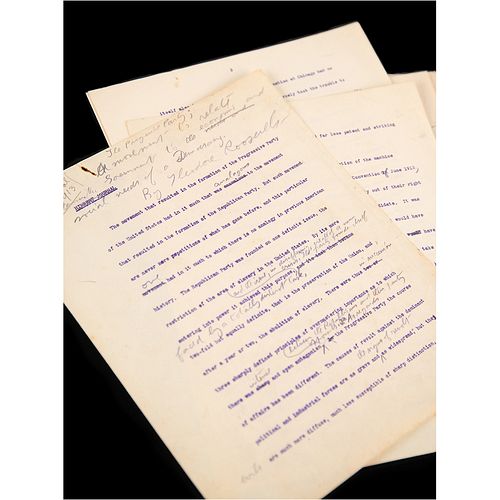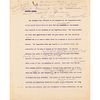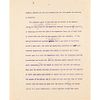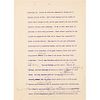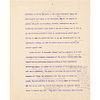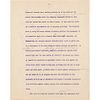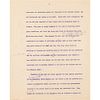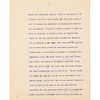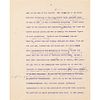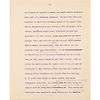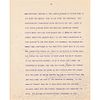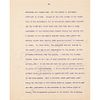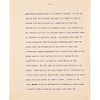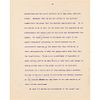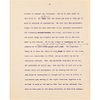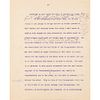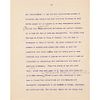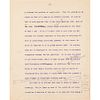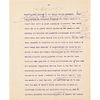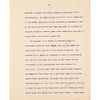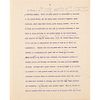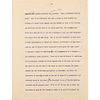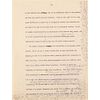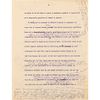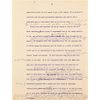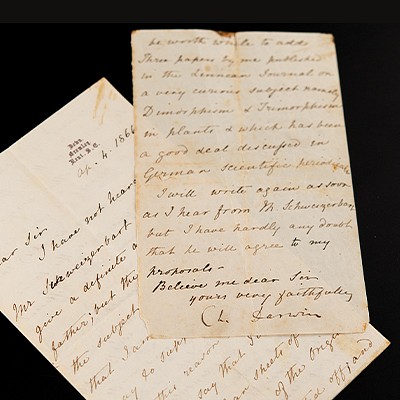Theodore Roosevelt Signed and Hand-Edited Manuscript: "The Progressive Party; A movement to relate Democratic Government to the economic and social ne
Two ways to bid:
- Leave a max absentee bid and the platform will bid on your behalf up to your maximum bid during the live auction.
- Bid live during the auction and your bids will be submitted real-time to the auctioneer.
Bid Increments
| Price | Bid Increment |
|---|---|
| $0 | $5 |
| $50 | $10 |
| $200 | $25 |
| $500 | $50 |
About Auction
Apr 17, 2024
With nearly 900 lots up for auction, RR Auction's April Fine Autographs and Artifacts sale focuses on historic material from the 19th and 20th centuries. Among the highlights are a rare check signed by Abraham Lincoln; a significant Leon Trotsky publishing contract; important scientific letters by Albert Einstein and Charles Darwin; several remarkable naval manuscripts; and a historic letter by Martin Luther King, Jr. on the integration of higher education. RR Auction support@rrauction.com
- Lot Description
Exceptional typed manuscript draft for an article by Theodore Roosevelt, titled and signed at the head in pencil, "The Progressive Party; A movement to relate Democratic Government to the economic and social needs of a Democracy, By Theodore Roosevelt," 25 pages, 8.5 x 10.5, no date but circa 1913. A forceful article attacking the Republican Party and the decisions made at the 1912 Republican National Convention, also outlining the history, purpose, and ideals of his newly formed Progressive Party—popularly nicknamed the 'Bull Moose Party.' Roosevelt makes extensive corrections to the text in pencil, adding and deleting words, phrases, and complete sentences; only one page remains unamended. The article was ultimately published in London's The Hibbert Journal (Vol. XII, No. 1).
In small part: "The movement that resulted in the formation of the Progressive Party of the United States had in it much that was analogous to the movement that resulted in the formation of the Republican Party. But such movements are never mere repetitions of what has gone before, and this particular one had in it much to which there is no analogy in previous American history. The Republican Party was founded on one definite issue—the restriction of the area of slavery in the United States. By its mere entering into power it achieved this purpose, and the issue, in disappearing, created a new crisis. The party found itself faced by a totally distinct task, two-fold but equally definite, that is the preservation of the Union, and, after a year or two, the abolition of slavery. There were thus in succession three sharply defined principles of overmastering importance as to which there was intense and open antagonism between the Republicans and their party opponents. As regards the Progressive Party the course of affairs has been different. The causes of revolt against the dominant political and industrial forces are as grave and the signs of revolt as widespread; but the evils are much more diffuse, much less susceptible of sharp distinction, and the remedies demanded are far more numerous and far less patent and striking in character.
The immediate cause of the break was the action of the machine bosses, and their masters, allies and tools at the Republican National Convention of June 1912, in swindling the rank and file of the Republican Party out of their right to choose their own platform and nominate their own candidate. It was such barefaced and insolent wrongdoing that in any event it would have forced a party bolt, and would not merely have justified but have rendered imperatively necessary the refusal of honorable men to take further part in or with the Republican Party until the dishonesty had been acknowledged and atoned for, and the dishonest agents expelled from the party leadership...
The men who stole the nomination at Chicago had no especial love for Mr. Taft. Half of them scarcely took the trouble to conceal their contempt for him, and the great majority had been violently opposed to him four years previously. He was in their minds merely an instrument or rather merely an excuse. Almost without exception the men of power who engineered the theft did so because they represented the forces of extreme reaction. They were for the most part professional politicians and big corporation lawyers, and they were carrying out the commands of the plutocracy, of the great financial forces whose social and political ideals are to be found in the ancient Phoenician trade oligarchies...Unless the fact is thoroughly grasped that the nomination of Mr. Taft represented the triumphant crookedness of the alliance between privilege in business and privilege in politics, the reason for the formation of the Progressive Party will not be understood...
Among the delegates to the First National Convention of the Progressive Party were women as well as men, one of them, Jane Addams, one of the leading personages in the convention, seconded my nomination. It was a noteworthy gathering. Almost every class of the community was represented—always excepting the bread and butter machine politician who is usually the dominant figure at such conventions. Catholic and Protestant, Jew and Gentile, white and black, native born and foreign born, man and woman, rich man and poor man, learned man and simple man, all alike were represented in the gathering at Chicago.
Indeed the great lack was the lack of practical politicians, of men accustomed to the work of political organization. There was also very small representation of men of wealth, moreover ninety-six per cent of the newspapers were against us, so that the channels of communication to our countrymen, if not choked, were at least used in such manner as to make it very difficult to get our position put fairly before our fellow countrymen. About all we had was enthusiasm, disinterestedness, and, curiously enough, hardheaded common sense so far as the policies we advocated were concerned...
The principles laid down were really merely the principles of Abraham Lincoln applied to present day needs. Owing to the condition of things in the South we made but little progress there, and in the North we had to face the fact that the Democrats had made the strongest nomination they could have made, and went into the campaign with a nearly united party, confident of overwhelming victory...Under the circumstances our showing was remarkable. We beat the Republican Party by three quarters of a million in the popular vote, and ten to one in the electoral vote; and in the majority of the Northern states we ran a good second the Democratic Party, and we carried some of them. Moreover we forced the Democratic and Republican parties, in spite of their bitter denunciation of us, to pay at least lip loyalty to certain of the principles we advocated.
These principles in their essence are simple. First and foremost we believe in making the people really sovereign...Sovereignty must always go with government, with control. Where people cannot themselves furnish that government, and that control, where they have not the self-control upon which self-government rests, then the control and the government must come from without. But we believe that in the United States it is the people themselves who can in the long run best govern themselves and their country...The Progressive proposal is to restore the sovereign power to the people where it rightfully belongs...We hold that the Constitution belongs to the people. They made it, and they fought for it. They paid for it with their blood in time of war, they supported it by their money and their effort in times of peace. Theirs is the right after due deliberation ultimately to decide what it shall be held to mean in any given case where the legislature and the court conflict as to a law being constitutional...We simply desire to restore or re-assert the right of the people themselves ultimately to decide between the two governmental agencies, in the event that they differ as to their interpretation of what the people meant when they made the Constitution...
We are attempting a difficult task, for we are trying to get people to accept and act on truths instead of half-truths; and everyone knows that while a half-truth is usually very simple and very attractive, the whole truth is almost always complicated and rarely easy of apprehension...One man will advocate practical efficiency and another idealism, as if the two were in some way incompatible. Yet surely from the days of Alfred to those of Hampden, from the days of Washington to those of Lincoln, the great movements for the advance of mankind have always been useful in much the proportion that those leading them and taking part in them combined a high idealism of purpose and spirit with a resolute common sense in translating that idealism into the terms of practical efficiency...
Finally and most important we are not trying to destroy the old moral sanctions. We are trying to supplement them by the larger sanction of the new collective morality. We are trying to make them stronger and not weaker. We wish to establish the same moral law for the two sexes, but we wish to do it raising the morality of the man, not by lowering the morality of the woman. We recognize fully that everything we do for the democracy will be futile unless the democracy acts for itself in a spirit of loyalty to itself and the institutions it has created for the expression of its highest thought and purpose...We of the Progressive Party feel that much good will come from putting upon the statute books the laws that we advocate. We believe that much good will follow if the government enters on the path of policy which we have marked out. But we believe that most good will come from a change body of public opinion, which will stand back of the laws and strengthen them and be strengthened by them. Assuredly a broader and deeper sense of brotherhood, combined with a higher and finer sense of individual responsibility, will grow in the souls of the men and women who in good faith, with cool sanity of judgment and burning fervor of soul, undertake the great task of bringing nearer the day when free peoples of the civilized world shall at last know a true democracy." In fine condition. Accompanied by a photocopy of the article as published in The Hibbert Journal: A Quarterly Review of Religion, Theology, and Philosophy. A remarkable explication of Theodore Roosevelt's progressive ideals and values, written with the power and ability for which he is known. - Shipping Info
-
Bidder is liable for shipping and handling and providing accurate information as to shipping or delivery locations and arranging for such. RR Auction is unable to combine purchases from other auctions or affiliates into one package for shipping purposes. Lots won will be shipped in a commercially reasonable time after payment in good funds for the merchandise and the shipping fees are received or credit extended, except when third-party shipment occurs. Bidder agrees that service and handling charges related to shipping items which are not pre-paid may be charged to a credit card on file with RR Auction. Successful international Bidders shall provide written shipping instructions, including specified Customs declarations, to RR Auction for any lots to be delivered outside of the United States. NOTE: Declaration value shall be the item’(s) hammer price and RR Auction shall use the correct harmonized code for the lot. Domestic Bidders on lots designated for third-party shipment must designate the common carrier, accept risk of loss, and prepay shipping costs.
-
- Buyer's Premium



 EUR
EUR CAD
CAD AUD
AUD GBP
GBP MXN
MXN HKD
HKD CNY
CNY MYR
MYR SEK
SEK SGD
SGD CHF
CHF THB
THB